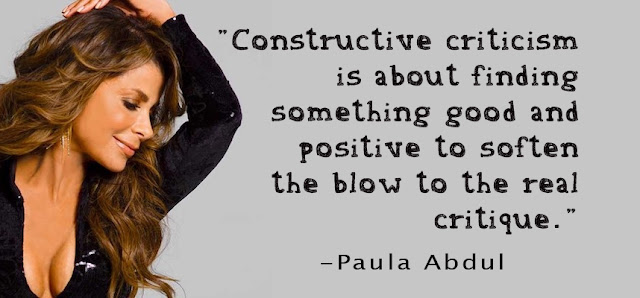When I was 16, I attended a New Orleans writing class where two of the three teachers criticized me for not speaking up more in critique circle.
I had undiagnosed social anxiety back then, but mainly I was trying to learn how to offer critiques without hurting anyone's feelings. Those two teachers didn't care about that, even told us at the start of class that we shouldn't let our feelings get hurt by critiques, but I still cared. I wanted to learn how to help while also being kind and considerate. I would have liked at least one lesson on how to do that, but those two bastards obviously didn't see the point.
Twenty years have passed, and I still prefer my way to their way. It's not about watering down feedback but about the way it's phrased, the way it's offered, the tone. Over the years, I've given and received plenty of critiques, and I'm now able to verbalize my opinion in a way I couldn't at 16.
Critiques tend to go looking for problems. It becomes a game of nitpicking, as critiquers often feel like they have to find something wrong for their feedback to be worthwhile. There's pressure to find something wrong, so, if your work doesn't have many issues, people will just kind of... latch onto something small just to have feedback for you. Critique also gives permission to be unusually harsh, and some writers will take the opportunity to exercise their wit at your expense because it's allowed in the critique format. (Those two teachers liked to sharpen their wit on us students. Again: bastards.)
I find I much prefer constructive criticism. Functionally, it's what I was trying to do at 16 in my writing class. Instead of nitpicking or hunting down potential problems, constructive criticism only really points out problems when they pop up, rather than laser-focusing.
It's the difference between polishing a gemstone and cutting a gemstone. One focuses on smoothing away rough edges, and the other harshly cuts away imperfection, sometimes to the point of hacking indiscriminately. Some work needs extra cutting, some needs extra smoothing. But when someone starts to hack indiscriminately, to cut away everything, the gemstone starts to look more like a grain of sand.
I like constructive criticism because it lends itself better to friendly feedback, and there's less pressure to find something wrong. I've seen far too many critiquers dig up problems that aren't really problems in someone's work just to have something to say about it, and that is ultimately unhelpful and misleading. Giving a critique often feels like you're not allowed to approve of the story or selection the way it is, that you're letting the person down if you find nothing, that they'll be disappointed. But I've found that, most of the time, writers just want to see if another pair of eyes can pick up on something they've overlooked. And they'll be reassured if the critiquer can't find anything. I know I'd be pleased to put my work out there for critique and have someone just say, "I honestly couldn't find anything wrong," because who doesn't want to hear that their hard work is ready for The Powers That Be?





